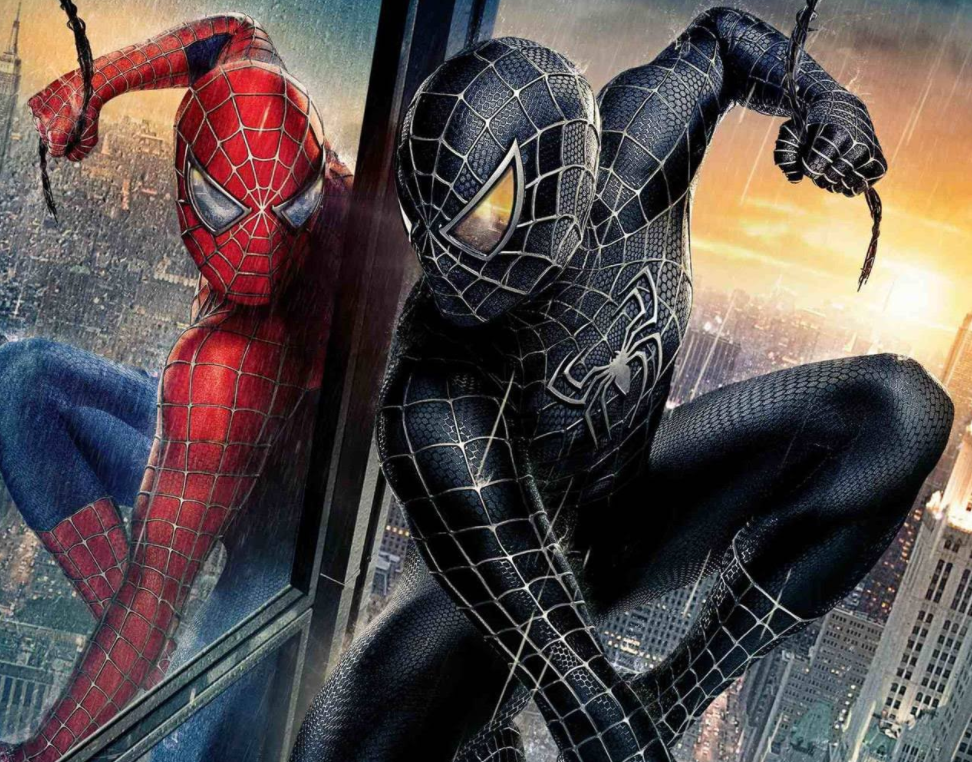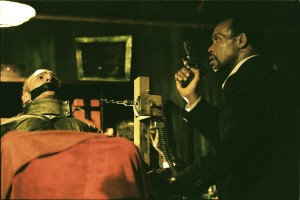5 Questions for Jakob’s 500th Now Playing Podcast Review
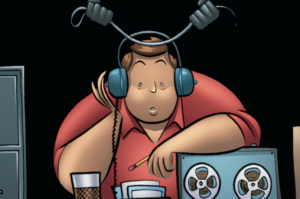
As Justice League limps out of theaters, anguished studio executives are lamenting the superhero flick’s failure to capture box office glory. Little do they know the arrival of DC’s team-up did capture one long-awaited milestone: Jakob Brewster’s 500th episode of Now Playing Podcast.
The host joined the show on November 6, 2009 during the Saw retrospective (a series that recently came back from the dead) and has since lent his perspective to some of Now Playing’s biggest retrospectives, including the Marvel, Children of the Corn, and Fast and the Furious films.
To mark the anniversary of his 500th show, Jakob took part in a Q&A with the Venganza Media Gazette.
Gazette: First, congratulations on 500 episodes of Now Playing Podcast. When you first signed on, did you ever think you’d get the chance to review the fifth sequel to Hellraiser?
Jakob: Thanks! I know it wouldn’t have been possible to make it to 500 if it weren’t from some great franchises out there like Children of the Corn and Leprechaun that churn out so many quality sequels to push Now Playing to keep going and mining these cinematic gems.
You always hope a franchise makes it to a fifth sequel, because that’s when the mythology is really developed and some rich stories can finally be told. Hellraiser: Hellseeker really completes the circle by bringing back Kirsty (played by the original Ashley Laurence) and finishing her story in such a way that even the best fanfic couldn’t achieve.
The shame is that not every franchise capitalizes on this opportunity. Like the Marvel Cinematic Universe, their sixth film in was The Avengers. Wow, what a misstep! They had set up such a great nemesis when hinting of The Leader (Tim Blake Nelson) in one of the only passable MCU films, The Incredible Hulk. And they do nothing with him! He’s the only villain that would require a whole team of heroes to defeat him. Also, that CGI model for Bruce Banner looked nothing like Edward Norton in The Avengers.
Gazette: You recently celebrated your milestone with a review of Justice League, how has that movie raised the bar for superhero films?
Jakob: It accomplished so much! On a technical level, it proved that computers can create 1000 percent realistic humans. This is great because it will let actors really focus on perfecting their craft instead of having to spend all their time grooming and looking perfect. No longer exists the burden of wasting time getting your hair styled or shaving a beard when the magic of CGI can render you as perfect and real looking as Henry Cavill’s upper lip.
It also introduced a layer of subtext that has never been explored in the superhero genre (Halle Berry’s Catwoman came close). I mean, Batman dresses as a bat to scare bad guys. But he also has a giant robot spider to ride around in? That’s two animals, plus lots of people are afraid of robots. So Batman is two kinds of phobia plus both animals? Chris Nolan wishes his Dark Knight trilogy plumbed the depths of psychology like this.
I could go on for hours gushing about Justice League. It feels as pivotal as when people were first awed by the last great achievement in superhero cinema, Superman and the Mole Men.
Gazette: Now that he’s directed both the Avengers and Justice League, which superhero team should Joss Whedon tackle next?
Jakob: Honestly, it feels like Justice League has reinvigorated Whedon. The Avengers felt like a clip-show episode of Buffy the Vampire Slayer. I think Whedon’s real calling is to make sense of production disasters. He saved Justice League from [Zack] Snyder and created a front-runner for the Best Picture Oscar. I’d like to see him save a franchise cut from the same cloth as superheroes. Something with a history of cartoons, comic books, toys, a whole team of good guys fighting evil. I say give him Michael Bay’s Transfor — all of [his] released films. Have him reshoot some scenes with Shia LaBeouf and a few of the action scenes and I think everyone will understand how great that franchise could be.
Gazette: Your 500 episodes of Now Playing Podcast are longer than the combined runs of Knight Rider, Baywatch, and Baywatch Nights. Besides Looking for Freedom, what’s your favorite David Hasselhoff album?
Jakob: I’m going with his latest album, 2012’s This Time Around. This was a redemption album for the drunken cheeseburger incident. It took a lot of courage to put himself out there again like that. His fans… and the world, really, have embraced him for being so brave.
Gazette: Lightning round: Three thoughts on that Avengers: Infinity War trailer?
Jakob:
- Disney has destroyed the Marvel movies. They used to be edgy and, while never achieving the greatness of, say, Return of Swamp Thing, they felt like they had something to say about our lives. Now because Disney needs a new Disney Princess to market to little girls, they’ve created this new princess… The Anos, or something, who goes around collecting jewelry?
- Again, Disney is now putting its own characters in these films?! At the end, Thor asks some people who they are and I swear Mickey Mouse is standing there. Though the CGI model is waaaay off. He looks like a raccoon, not a mouse.
- A group of heroes come together to fight hoards of aliens and a being from another dimension who is powered by a magic box? I’ve already seen this in Justice League. It was first, it was better, and it just has better characters. For example: Cyborg vs. Iron Man. One is made of space metal and the other iron (which I think is getting rusty because it is so red from oxidation). No contest.
Hear Jakob in Now Playing Podcast’s current Death Wish retrospective, and read his thoughts on underrated movies in the podcast’s first book, Underrated Movies We Recommend.
December 6, 2017 Posted by Jason Latham | Now Playing Podcast | Avengers, Death Wish, Hellraiser, Jakob, jakob brewster, Justice League, Now Playing Podcast, Saw | Comments Off on 5 Questions for Jakob’s 500th Now Playing Podcast Review
On 10th Anniversary, ‘Now Playing’ Hosts Talk Milestones, Memorable Moments
Let’s jump back in time 10 years to summer 2007. Sam Raimi had just tanked the Spider-Man franchise, the Fast & Furious films had stalled with Tokyo Drift, and nobody knew if George Lucas would ever launch another Star Wars trilogy.
This was when Now Playing Podcast first went on the air. Back when we still believed Crystal Skull might be good and before they rebooted Freddy’s origin story to make it, just, icky.
Not only does 2017 mark Now Playing’s 10th anniversary, the upcoming War for the Planet of the Apes review marks its 700th episode. That’s a lot of movies (and also the occasional failed TV pilot or one of those superhero shows that played theatrically in Bulgaria or wherever).
To mark the occasion, the show’s hosts came together for a Q&A about their time behind the mics and what’s changed during the last 10 years.
Venganza Media Gazette: What do you remember thinking after you heard your voice for the first time on Now Playing?
Arnie: “Well our first episode was recorded in a car in the parking lot of a Toys r Us. So my thought was, ‘For being in a car that doesn’t sound TOO bad.’”
Marjorie: “I was used to hearing my voice on Star Wars Action News but I still thought I sounded under 13. And then you have the thoughts such as ‘I really sound like that?’ or ‘What if people find my voice irritating?’”
Stuart: “I like to be behind the scenes — directing, writing, evaluating other people’s art. It was pretty painful to step in front of a mic and even more awkward listening to myself on some of my early shows. I was grateful that there weren’t too many listeners back in 2008 and early 2009.”
Jakob: “I was no stranger to hearing my voice; I had sang in bands and had been podcasting on and off for a few years prior. But at the time a huge part of our listenership were horror fans, a genre I wasn’t very familiar with. So there was some anxiety with having my introduction with the SAW movies and having to speak about a genre I just didn’t have a lot of exposure to.”
Venganza Gazette: What’s changed about you as a host?
Jakob: “I watch a lot more movies and I discuss them a lot more — not just with my co-hosts, but with my family. We spend a lot of time discussing why a film does or doesn’t work.”
Marjorie: “I have a different view of movies now. I see so much more that goes into a movie. More than just ‘it was good.’ I also can’t ever ‘turn off’ reviewing. When I see movies I’m not reviewing, I tend to dissect them.”
Jakob: “My wife and I share what we consider great scenes with our girls, even if they may be too young for the entire movie. Is it crossing a line that we reenacted the ‘I drink your milkshake’ scene from THERE WILL BE BLOOD for our 10 and 6-year-old?”
Stuart: ”The biggest change for me is the zip code where I record. I’m no longer ‘Stuart In L.A.’ When I started Now Playing I always worried that things I said might come back to haunt me working in the Los Angeles entertainment industry. Now that I’ve stepped away from that scene, I sleep better at night.”
Arnie: “The differences are greater than the similarities, in my mind. What’s the same? A rotating cast of hosts and we devote one episode to one movie. What’s different? Everything else. Now Playing started as a show where we would record short, spoiler-free movie reviews.”
Stuart: “A long show in 2007 was 30 minutes. Now we go twice as long on an episode of Twin Peaks.”
Arnie: “They weren’t going to be edited at all, as editing takes five-to-10 times the length of a given show.”
Brock: “I do remember editing the first show I did with my wife – back then it was a two person review show, much like what Arnie and Marjorie do on Star Wars Action News.”
Arnie: “As I had Star Wars Action News already I didn’t feel I had the time to undertake more editing. So they would be instant reaction thoughts, recorded immediately upon leaving the theater, and published as-is [with] minimal editing, [and] we also were going to focus on new releases only. Now we go through the history of film, with spoiler-filled critiques that are very long, and very well edited by a great team including Heath and David.”
Jakob: “We just go so much more in depth now. But for me, personally, I approach the show with a different attitude. When I first came on, I had a MST3K mentality. I mean, I had to review a bunch of SAW films — not really my thing — so I thought, ‘How many jokes can I make?’ Now, while we still shoot for humor at times, I try focus on the filmmaking and storytelling so I can articulate how those contribute to a film, good or bad.”
Brock: “Today we are a well-oiled machine, even more comfortable sharing our opinions and talking with one another. The shows back then, and especially when we started the roundtable format, had the best we could do technically at the time, and now the production values are insanely great thanks to our equipment, sure, but mostly because of the countless hours Arnie puts in producing each and every episode. And also the incredible, tireless work of our talented editors who make us all sound so good.”
Marjorie: “We are all so much older and wiser! I think that we all found our rhythm with each other. I have a natural rapport with Arnie because we are married and therefore spend a lot of time together. But Stuart, Jakob and myself had to build that.”
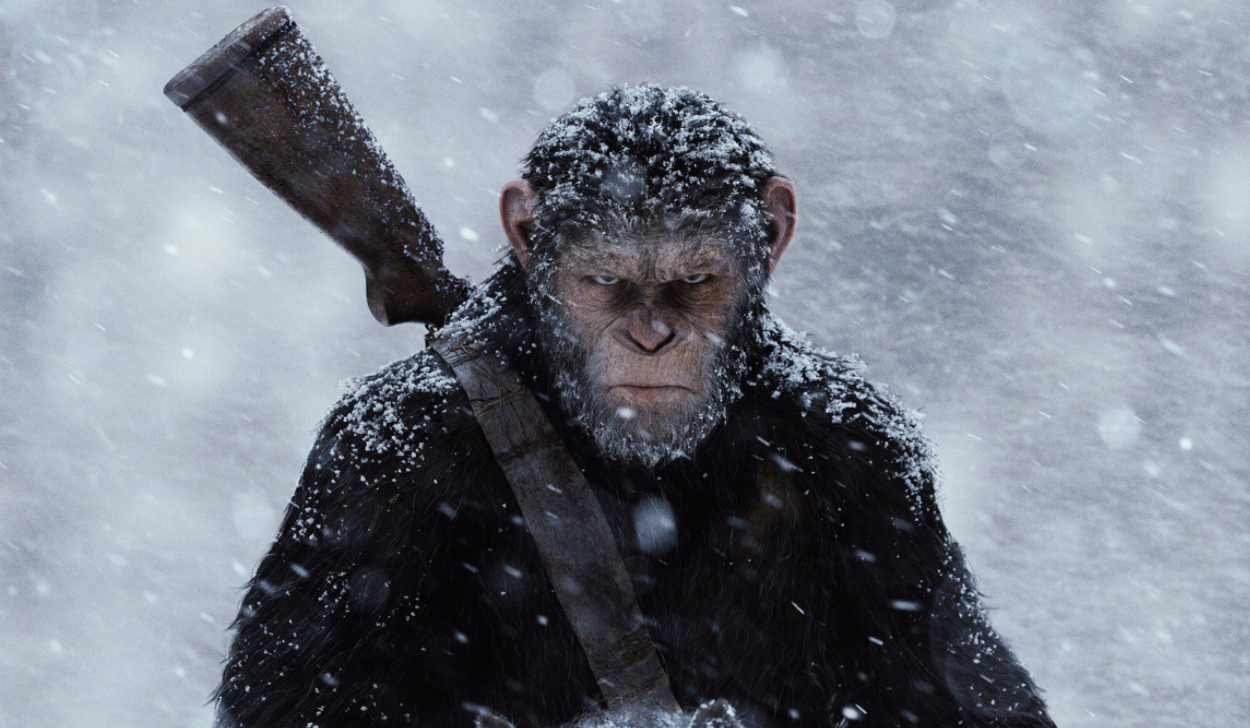
The July 14, 2017 War for the Planet of the Apes review marks Now Playing Podcast’s 700th episode.
In addition to hitting the 700th episode milestone, several of the hosts are racking up big numbers behind the microphone. When the War for the Planet of the Apes review is released, Arnie will have hosted 676 Now Playing episodes, Stuart will have hosted 618, and Jakob will have hosted his 469th show.
Venganza Gazette: Do you have a favorite Now Playing episode?
Stuart: “INCEPTION was an early favorite of mine because I think it was such a turning point for the show. Now Playing proved in that podcast that we could do more than heckle. On top of really liking the movie, I was proud of the way we broke down all of Nolan’s multi-level storylines and daunting thematic readings in a very concise 73 minutes.”
Arnie: “I really am proud of PROMETHEUS. That was a film with disparate, and surprising, opinions from the hosts, and yet the conversation was always lively, and I think everyone made such great points. I re-listened to that show recently because of ALIEN: COVENANT and so it’s recent to my memory, but even before that it was a go-to for me to see three of the hosts bringing their A-game.”
Brock: “I really liked what the guys did with RAIDERS OF THE LOST ARK. Sometimes with a really good movie, a classic, practically flawless movie the show can be a little harder for us panelists to do. You can’t tear it apart, and there aren’t always opportunities to make jokes because the jokes have been made for 30 years already. Everyone is so familiar with the movie itself and the behind the scenes information already and on top of that the listeners know going in it that the hosts are all going to give it a green arrow. The team embraced all these challenges and showed us why Now Playing is as good as it gets with review shows. The guys did a great job with the commentary, the trivia, and played off one another beautifully making an entertaining show that was structurally and technically proficient. So much so that I have enjoyed listening to that show multiple times over. A highlight for me is when Stuart brought up the CASABLANCA correlation; not many people get that aspect of RAIDERS and I’m glad he did and shared it with the audience.”
Jakob: “I’m really enjoying our current Now Peaking discussions for TWIN PEAKS: THE RETURN. What’s fascinating is we had the chance to do a whole David Lynch retrospective building up to this new series. With Lynch, as an auteur, there is so much of him in this return to Twin Peaks. It feels like a culmination of his entire aesthetic and viewpoint. Within the first two episodes we had brought up the influences of ERASERHEAD, BLUE VELVET, LOST HIGHWAY, MULHOLLAND DRIVE, and INLAND EMPIRE. I’m still not sold on this third season, but it has been insightful to discuss it in the context of Lynch’s complete works and not just the original run of the television show.”
Venganza Gazette: What’s the most positive feedback you’ve ever received from a listener?
Arnie: “I can’t begin to express how touched I am by some listeners’ messages to us. From troops stationed overseas who use our show to experience movies they can’t yet see to adults who say our show is like a conversation with friends, each message means so much.”
Marjorie: “There have been a few people who have written to us about how listening to Now Playing got them through a rough patch in their life. And I think it’s utterly amazing that, even remotely, I was able to help someone.”
Stuart: “I never thought three people riffing on movies had the potential to heal, but I have been incredibly moved by all the stories fans have shared over the years about how we helped them laugh away depression, death, and some real big life challenges.”
Arnie: “A handful of people have e-mailed with a very specific message and I’m humbled every time I read them. These are people who have been in bad situations: illness or accident, divorce, job loss, the death of someone close to them, or sometimes a combination of those. These are people who tell us they felt hopeless. One person said, ‘I felt like I would never be able to laugh again.’ A couple people mentioned contemplating suicide. These are deeply personal moments being shared via e-mail with us. Then their notes change tone and discuss how our show helped them through. We entertained them, in that one case we gave him the first laugh he’d had. We took their minds off their troubles and brought them a bit of happiness. That is my dream come true — to be able to entertain people and give them a few moments where they aren’t thinking about their day, their responsibilities, and their problems.”
Stuart: “I never expected to have such impact on anyone, and I’m incredibly humbled by that.”
Arnie: “It took me a while to figure out what I wanted to do with my life. I considered being a lawyer or a stockbroker. But in high school I realized the importance of entertainment in my life. I had my own dark days in my teen and early adult years. What got me through those times were video games, movies, television, books – entertainment. So starting in high school, and really for the rest of my life, my goal has been to entertain. I wanted to give people that escape the way Gene Roddenberry, George Lucas, Will Wright, and Stephen King helped me to escape. My path to finding podcasting as that vehicle was a winding one, but it was the outlet I found. And I can’t express how touched I am when I read what we do does provide that for some of our listeners. It fills me with purpose, and reminds me that we’re not just discussing the eighth in a bad series of direct-to-video sequels, we’re hopefully also entertaining and informing at the same time.”
Venganza Gazette: What’s the strangest feedback you’ve ever received from a listener?
Brock: “I was at a Comic Con, talking to the vendor on the other side of the table about an action figure or something, and this guy standing next to me exclaimed ‘Hey, you’re Brock! I recognize your voice!’ That was pretty cool to be picked out by my voice alone.”
Marjorie: “I had some weird messages from guys who liked my voice.”
Stuart: “It was pointed out very bluntly a few times on Facebook that I have a ‘squeaky voice’ when I get excited. Hey, I’m not going to say that’s untrue, but there’s only so much I can do about that until I finish going through puberty. How I wish I could hire Barry White to say all the things I’ve got to say!”
Brock: “There was this one [comment] we received years ago that accused me of trying to sound professional, putting on a radio voice when I talk or something. Arnie told Stuart and I about this thing one night when we were recording, and we all got a great laugh because this is how I talk! I wouldn’t have the patience or the discipline to put on a fake voice for hours on end, each and every time we do a recording session. I mean, I guess that is sort of a compliment, that my voice sounds that way, but the guy clearly didn’t have a clue about what he was talking about.”
Jakob: “One listener offered to pay for my dental work after he punched my teeth out because of my views on one film. I wonder if the police I had to involve became fans of Now Playing after I reported [him]?”
Arnie: “I need to be vague about this for privacy, but a listener wrote in and told me how, in 2012, he had a workplace encounter with Bradley Cooper [and] he ended up turning Cooper on to Now Playing, specifically our HOWARD THE DUCK show. The next day Cooper told him he laughed his ass off listening to that podcast. He said he downloaded some other shows, including our ROCKY reviews. That is totally surreal to think of the voice actor who performed in GUARDIANS has listened to our HOWARD THE DUCK review.”
Stuart: “We get a lot of positive feedback when we slam a problematic movie like HOWARD THE DUCK or HALLOWEEN III.”
Venganza Gazette: What’s the one film you’re still waiting to review?
Jakob: I’d love the work through Paul Thomas Anderson’s THE MASTER. It’s a film that I’ve done a complete 180° on since its theatrical release. Originally, I recognized the amazing acting but the story left me cold. I recently re-watched it with my wife, who is a huge Phillip Seymour Hoffman fan. As we worked our way through the film, she helped me realize what a heartbreaking romance it is in the midst of some heavy ideas about religion and post-war America. I would love to discuss such a dense piece of work.”
Stuart: “THE MANITOU! There is no crazier horror movie from the 1970s. It would be a perfect Easter Egg pairing with THE OMEN and ROSEMARY’S BABY franchises.”
Marjorie: “I would love to do a 70s disaster movie retrospective. There was a small heyday of disaster movies.”
Arnie: “DONNIE DARKO is a favorite film of mine that I think is so rich for analysis, even if the director did make it so obvious with various supplements and the director’s cut.
Brock: “BUTCH CASSIDY AND THE SUNDANCE KID. It’s my favorite movie, and the first movie I say when people ask me for a film recommendation. Every time. Not enough people watch it anymore but they really should. It’s not a traditional western, but can be a hard sell to people who deeply dislike westerns. Perhaps we can bundle it THE STING and that sequel they made in 1979 with Tom Berenger. I have avoided watching that sequel but I’d watch it for Now Playing.”
Arnie: “I made a vow to never watch S DARKO, the cash-grab DONNIE sequel with hardly anyone from the original involved. If we reviewed DONNIE I’d probably have to watch S, and I really don’t want to taint my love of the original with a super-shitty sequel.”
Now Playing Podcast will release its War for the Planet of the Apes episode as part of its 2017 Spring Donation Drive. Supporters of the show can hear the review, along with all of the episodes in the Planet of the Apes series, at NowPlayingPodcast.com.
July 10, 2017 Posted by Jason Latham | Now Playing Podcast, Podcasts | Alien: Covenant, Arnie Carvalho, brock, Butch Cassidy and the Sundance Kid, David Lynch, Donnie Darko, Eraserhead, inception, Inland Empire, jakob brewster, Lost Highway, marjorie carvalho, Mullholland Drive, Now Playing Podcast, Podcasting, prometheus, Raiders of the Lost Ark, Saw, Spider-Man 3, Star Wars Action News, stuart atkinson, twin peaks, war for the planet of the apes | 9 Comments
The 40 Year-Old-Critic: Saw (2004)
![saw-poster[1]](https://venganzamedia.com/Gazette/wp-content/uploads/2014/09/saw-poster1-210x300.jpg) In The 40-Year-Old Critic, Venganza Media creator and host Arnie Carvalho recalls a memorable film for each year of his life. This series appears daily on the Venganza Media Gazette.
In The 40-Year-Old Critic, Venganza Media creator and host Arnie Carvalho recalls a memorable film for each year of his life. This series appears daily on the Venganza Media Gazette.
During the last decade, much of our national conversation was centered on torture, both in current events and entertainment.
We’d read headlines about waterboarding and rectally-inserted broom handles, leaving us questioning the purpose and moral justification for torturing prisoners of war. Then, when we turned the page to the Entertainment section we’d read about reality show contestants undergoing some form of painful humiliation for fame; while at the multiplex, a new sub-genre of film was emerging: torture porn.
The term was coined by New York Magazine writer David Edelstein in 2007, but his christening of the brand name came after the release of Saw, the film that put torture porn in front of the masses and defined the horror experience of the first decade of the 21st century.
With torture surrounding us in real life why would audiences pay money to see make-believe torment on screen? I think Americans are comfortable taking horrible scenarios and making them “safe” through fiction. During the September 11 attacks we heard stories about people so panicked by the oncoming fire that they jumped from the high windows of the Twin Towers. Their terrible choice was a nightmare for our nation, that thought of having to either burn or leap to your death. Yet with films like Saw writers and directors took that same life-or-death choice and, because it was a movie, made it safe.
With these films we in the audience could both sympathize with the tortured, while also desensitizing ourselves to the acts on screen.
Perhaps we needed fictional torture to help us accept what the nation was experiencing?
Or perhaps we just wanted to push the boundaries of experience a little further through film?
I know I was looking for something new in horror. After 1999’s successful The Blair Witch Project it seemed Hollywood was smitten with low-budget ghost stories. Recycled J-Horror found success, praised by audiences and critics. I saw those films, but I continued to seek something more; something that was more dangerous than a PG-13 rating would allow, a movie that would push my boundaries the way Hellbound: Hellraiser II had in the 1980s. I wanted more than a bit of spooky suspense found in films like The Ring and The Grudge. I wanted a visceral feeling of life stretched to its most extreme limit.
I had no idea that’s what I would find when I watched Saw.
The film was low-budget — barely more than $1 million — and made by filmmakers who were inspired by the scares Blair Witch delivered, despite that film’s smaller cast and even smaller cost. Saw creators James Wan and Leigh Whannell started by making a 30 minute proof-of-concept film. Its effectiveness helped them raise the money they needed to hire a cast of accomplished actors, including Danny Glover and Cary Elwes.
The story seems simple enough — two men are chained up together in a room, and a dead body separates them. They must uncover clues, or saw off their own feet, to escape. Yet, while keeping a small scope, Whannell’s script created the first iconic horror villain of the 21st Century: “Jigsaw” John Kramer. Played by Tobin Bell, Kramer was a man dying of cancer. With little time remaining he begins to set intricate traps for people to help them live the rest of their life to the fullest — or die trying to escape.
As Jakob, Marjorie, and I mentioned in our 2009 Saw Retrospective Series, the concept of Jigsaw was not terribly original. This mastermind is merely an iteration of John Doe from Seven, but with a dash of the self-fulfillment agenda of Fight Club’s Tyler Durden. After all, Jigsaw’s trap of making a suicidal man cut himself is not that different than John Doe’s punishment for “Lust”; death by intercourse with a bladed phallus.
Yet, despite the similarities, there is one key difference: in Seven we found almost all of John Doe’s victims after the fact. When Seven‘s main characters, two police detectives, discover “Sloth” he’s already wasted away, and “Pride” is already dead. In Saw the cast has expanded; our main characters are the victims of the trap and we get to watch them faced with their tests.
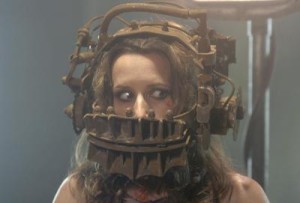
Shawnee Smith’s character Amanda escaped this trap to appear in five more Saw films.
More than just the two men in the room, the story grows to include more victims. Even for those introduced after an encounter with Jigsaw we still get to witness their torment in flashback. These scenes are myriad, from a woman in an iron collar that will tear her skull apart to a man, covered in napalm, having to hold a candle to read writing on a wall.
It’s not just that these victims were going to die in brutal ways (that was de rigueur for horror films since The Texas Chain Saw Massacre), but Saw upped the stakes by combining the suspense of impending horror. It was no longer just a killer behind the door, now there is a ticking clock and when it reaches zero someone will die, and in their last seconds they will harm themselves or others trying to escape.
These types of torment made waterboarding actually seem safe!
Though the creators of Saw would later claim the film was not torture porn, it was clearly the template for the dominant horror movement of the mid-2000s. Saw progressed through the scenes with characters put in increasingly more complex and convoluted traps, and I had the visceral reaction I’d sought. This movie did not scare me as Blair Witch did, but it repulsed me. I would flinch every time the next test came, knowing that the pain inflicted on the characters was fictional, but yet it hit home just the same.
The best part of it was that I was repeatedly asking the question: what would I do in those situations? Would I be able to cut off my own foot to escape a room? Could I kill a man in cold blood if the result was saving my own life? Could I take the pain of the razor cuts and escape the other side? And the absolute worst: could I shove both my hands in a shit-filled toilet to try and find a key?
Yet, a decade later I look back and wonder if subconsciously I made the connection between Elwes’ character, chained in a dirty shit-filled room, with those held in Guantanamo Bay. Neither the fictional character nor the real prisoner know if they will ever see daylight again, and both undergo horrible experiences before it ends… however it ends.
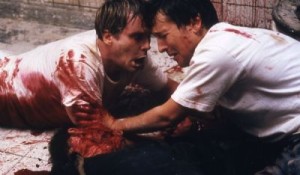
Dr. Lawrence Gordon (Elwes) and Adam Stanheight (Whannell) become brothers in blood on Saw’s dingy bathroom floor.
I can understand why Wan and Whannell would blanch at their hit being called torture porn. Porn usually indicates gratuitous sex (or sometimes action or gore) with no plot. Indeed, Saw has a plot as convoluted and twisted as any of Jigsaw’s traps. It’s clear to me that the two went through a lot of effort to create an involving story. Yet the fact remains that on my first watching I had trouble paying attention to the story for all that was thrown at me. It was a story that would become even more stretched and tangled as sequel after sequel followed, and for its labyrinthine complexity I actually grew to appreciate the franchise more.
Leaving that theater in 2004 I thought Saw wasn’t actually very good, but that’s because I was focusing on the plot (and the various holes it contained). Yet the images of the people in their torment stuck with me for quite some time.
More, as I previously stated, this film’s success created a new horror sub-genre, combining elements of the classic splatter film with the tropes of the slasher horror, yet drawing out the kill scenes in new and inventive ways. From the six Saw sequels to the Hostel films to The Collector to Turistas; each provided a new type of terrible vicarious experience. Truly the most extreme example in this sub-genre must be The Human Centipede — a film that I rejected in concept, but once its torture porn roots came through in the trailer I knew I was in for a treat.
But the genre burned out quickly. By 2009 Saw was clearly over, the sixth installment in the franchise losing a box office battle with the micro-budget found footage film Paranormal Activity. While a few more films, such as Saw: The Final Chapter and Human Centipede II were still to come, the election of President Barack Obama brought with it a shift in media attention away from Guantanamo Bay. That could be coincidence, but it seems more a causation — by the end of the decade humans were tired of facing torture, real or imagined, and preferred supernatural scares on screen. Their votes for political office matched their dollars spent at the box office.
As such, it seems torture porn will remain a symbol of early 21st century American movie-making. Yet out of that sprung some wildly inventive and visceral pictures that may yet inspire a future generation of filmmakers.
Tomorrow — 2005!
Arnie is a movie critic for Now Playing Podcast, a book reviewer for the Books & Nachos podcast, and co-host of the collecting podcasts Star Wars Action News and Marvelicious Toys. You can follow him on Twitter @thearniec
September 3, 2014 Posted by Arnie C | 40-Year-Old Critic, Movies, Now Playing Podcast, Podcasts, Reviews | 2000s, 40-Year-Old Critic, 9/11, Bush, Carey Elwes, Danny Glover, Enertainment, Film, horror, Jigsaw, Movie, Movies, News, Now Playing, Now Playing Podcast, Obama, Podcasts, Review, Reviews, Saw, Shawnee Smith, Terrorist, Tobin Bell, Torture, Torture Porn | Comments Off on The 40 Year-Old-Critic: Saw (2004)
-
Archives
- February 2021 (1)
- January 2021 (1)
- December 2020 (1)
- November 2020 (3)
- October 2020 (2)
- September 2020 (1)
- August 2020 (2)
- July 2020 (1)
- June 2020 (1)
- May 2020 (1)
- April 2020 (3)
- March 2020 (2)
-
Categories
-
RSS
Entries RSS
Comments RSS
Site info
Venganza Media GazetteTheme: Andreas04 by Andreas Viklund. Get a free blog at WordPress.com.
